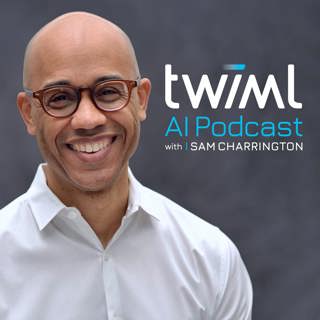
Agile Data Science with Sarah Aerni - TWiML Talk #143
Today we continue our TrainAI series with Sarah Aerni, Director of Data Science at Salesforce Einstein. Sarah and I sat down at the TrainAI conference to discuss her talk “Notes from the Field: The Platform, People, and Processes of Agile Data Science.” Sarah and I dig into the concept of agile data science, exploring what it means to her and how she’s seen it done at Salesforce and other places she’s worked. We also dig into the notion of machine learning platforms, which is also a keen area of interest for me. We discuss some of the common elements we’ve seen in ML platforms, and when it makes sense for an organization to start building one. The notes for this show can be found at twimlai.com/talk/143. For more details on the TrainAI series, visit twimlai.com/trainai2018
24 Maj 201838min

Tensor Operations for Machine Learning with Anima Anandkumar - TWiML Talk #142
In this episode of our TrainAI series, I sit down with Anima Anandkumar, Bren Professor at Caltech and Principal Scientist with Amazon Web Services. Anima joined me to discuss the research coming out of her “Tensorlab” at CalTech. In our conversation, we review the application of tensor operations to machine learning and discuss how an example problem–document categorization–might be approached using 3 dimensional tensors to discover topics and relationships between topics. We touch on multidimensionality, expectation maximization, and Amazon products Sagemaker and Comprehend. Anima also goes into how to tensorize neural networks and apply our understanding of tensor algebra to do perform better architecture searches. The notes for this show can be found at twimlai.com/talk/142. For series info, visit twimlai.com/trainai2018
23 Maj 201834min

Deep Learning for Live-Cell Imaging with David Van Valen - TWiML Talk #141
In today’s show, I sit down with David Van Valen, assistant professor of Bioengineering & Biology at Caltech. David joined me after his talk at the Figure Eight TrainAI conference to chat about his research using image recognition and segmentation techniques in biological settings. In particular, we discuss his use of deep learning to automate the analysis of individual cells in live-cell imaging experiments. We had a really interesting discussion around the various practicalities he’s learned about training deep neural networks for image analysis, and he shares some great insights into which of the techniques from the deep learning research have worked for him and which haven’t. If you’re a fan of our Nerd Alert shows, you’ll really like this one. Enjoy! The notes for this show can be found at twimlai.com/talk/141. For more information on this series, visit twimlai.com/trainai2018.
22 Maj 201837min

Checking in with the Master w/ Garry Kasparov - TWiML Talk #140
In this episode I’m joined by legendary chess champion, author, and fellow at the Oxford Martin School, Garry Kasparov. Garry and I sat down after his keynote at the Figure Eight Train AI conference in San Francisco last week. Garry and I discuss his bouts with the chess-playing computer Deep Blue–which became the first computer system to defeat a reigning world champion in their 1997 rematch–and how that experience has helped shaped his thinking on artificially intelligent systems. We explore his perspective on the evolution of AI, the ways in which chess and Deep Blue differ from Go and Alpha Go, and the significance of DeepMind’s Alpha Go Zero. We also talk through his views on the relationship between humans and machines, and how he expects it to change over time. The notes for this show can be found at twimlai.com/talk/140. For more information on this series, visit twimlai.com/trainai2018.
21 Maj 201832min

Exploring AI-Generated Music with Taryn Southern - TWiML Talk #139
In this episode I’m joined by Taryn Southern - a singer, digital storyteller and Youtuber, whose upcoming album I AM AI will be produced completely with AI based tools. Taryn and I explore all aspects of what it means to create music with modern AI-based tools, and the different processes she’s used to create her singles Break Free, Voices in My Head, and more. She also provides a rundown of the many tools she’s used in this space, including Google Magenta, Watson Beat, AMPer, Landr and more. This was a super fun interview that I think you’ll get a kick out of. The notes for this show can be found at twimlai.com/talk/139
17 Maj 201833min

Practical Deep Learning with Rachel Thomas - TWiML Talk #138
In this episode, i'm joined by Rachel Thomas, founder and researcher at Fast AI. If you’re not familiar with Fast AI, the company offers a series of courses including Practical Deep Learning for Coders, Cutting Edge Deep Learning for Coders and Rachel’s Computational Linear Algebra course. The courses are designed to make deep learning more accessible to those without the extensive math backgrounds some other courses assume. Rachel and I cover a lot of ground in this conversation, starting with the philosophy and goals behind the Fast AI courses. We also cover Fast AI’s recent decision to switch to their courses from Tensorflow to Pytorch, the reasons for this, and the lessons they’ve learned in the process. We discuss the role of the Fast AI deep learning library as well, and how it was recently used to held their team achieve top results on a popular industry benchmark of training time and training cost by a factor of more than ten. The notes for this show can be found at twimlai.com/talk/138
14 Maj 201844min

Kinds of Intelligence w/ Jose Hernandez-Orallo - TWiML Talk #137
In this episode, I'm joined by Jose Hernandez-Orallo, professor in the department of information systems and computing at Universitat Politècnica de València and fellow at the Leverhulme Centre for the Future of Intelligence, working on the Kinds of Intelligence Project. Jose and I caught up at NIPS last year after the Kinds of Intelligence Symposium that he helped organize there. In our conversation, we discuss the three main themes of the symposium: understanding and identifying the main types of intelligence, including non-human intelligence, developing better ways to test and measure these intelligences, and understanding how and where research efforts should focus to best benefit society. The notes for this show can be found at twimlai.com/talk/137.
10 Maj 201844min

Taming arXiv with Natural Language Processing w/ John Bohannon - TWiML Talk #136
In this episode i'm joined by John Bohannan, Director of Science at AI startup Primer. As you all may know, a few weeks ago we released my interview with Google legend Jeff Dean, which, by the way, you should definitely check if you haven’t already. Anyway, in that interview, Jeff mentions the recent explosion of machine learning papers on arXiv, which I responded to jokingly by asking whether Google had already developed the AI system to help them summarize and track all of them. While Jeff didn’t have anything specific to offer, a listener reached out and let me know that John was in fact already working on this problem. In our conversation, John and I discuss his work on Primer Science, a tool that harvests content uploaded to arxiv, sorts it into natural topics using unsupervised learning, then gives relevant summaries of the activity happening in different innovation areas. We spend a good amount of time on the inner workings of Primer Science, including their data pipeline and some of the tools they use, how they determine “ground truth” for training their models, and the use of heuristics to supplement NLP in their processing. The notes for this show can be found at twimlai.com/talk/136
7 Maj 201854min





















